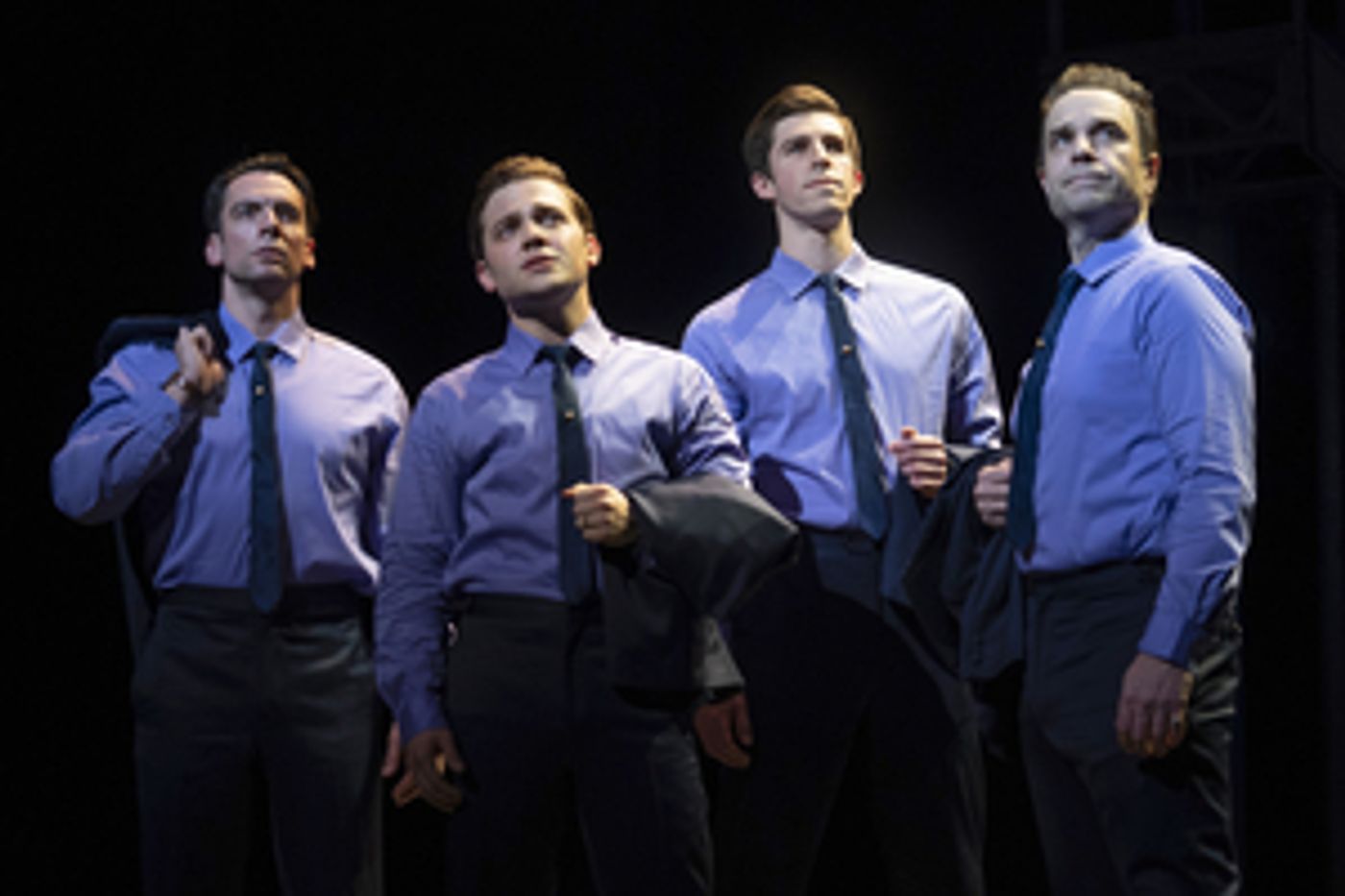Review: JERSEY BOYS Sings Tight, Sweet Harmony at Benedum Center
Pittsburgh CLO is back and better than ever with this season opener

Some things just don't go out of style. Nearly twenty years ago, director Des McAnuff and choreographer Sergio Trujillo kickstarted the "bio-musical" subgenre with Jersey Boys. Since then, dozens upon dozens of classic legacy acts from Johnny Cash to Carole King to the Temptations have seen their stories on Broadway, more than once with the McAnuff-Trujillo team reuniting to helm the project. But despite twenty years of innovation and experimentation, Jersey Boys is still the best one, especially when presented in McAnuff's iconic original staging as it is at Pittsburgh CLO.
Told in fourth-wall-breaking Scorsese fashion, the show tells the story of doo-wop group turned pop-rock legends Frankie Valli and the Four Seasons, as seen through the eyes of its non-Valli founders. Cynical wannabe gangster Tommy DeVito (Devon Goffman), laconic bass man Nick Massi (Matt Faucher) and gentle musical genius Bob Gaudio (Eric Chambliss) made up the machine, which ran on the voice of slightly enigmatic frontman Frankie Valli (Jon Hacker). Valli never gets his say until the very end of the musical, which leaves the monologuing to his compatriots until then, as the story leads through the highs, lows and legal woes of the mob-adjacent musicians.
Jon Hacker plays the Man Himself, and he has the voice down pat. That ringing power-mix that slides into the upper limits of the falsetto almost seamlessly is an indisputable requirement to play Valli, and Hacker has played Valli (and the supporting role of Joe Pesci) all over the place. Frankie Valli isn't a communicative character, so Hacker gets more chances to shine as a singer and dancer than as an actor, but that voice, man. That voice carries the whole show when it bursts free. If the show does have an acting heavyweight, it's Devon Goffman as Tommy DeVito. Goffman, as they say, understands the assignment. He's pure Scorsese through and through from the minute he turns to the crowd and starts his first monologue. He gets laughs consistently, and sings quite well despite describing himself as the weakest singer in the group. Still, the audience favorite seems to be Matt Faucher as Nick Massi. Massi doesn't say much, but when he does it's either pithy or explosive. Faucher milks the contrast in Massi's demeanor to the hilt, plus nailing the iconic "big dumb bass voice" that was such a common interjection in classic vocal pop.
As Bob Gaudio, Eric Chambliss- one of surprisingly few Jersey Boys virgins in the cast- plays the straight man to most of the preceedings. Gaudio was a songwriter and a music-industry professional, not a hood or a hustler like the rest of the Four Seasons, so he serves as an audience insert figure much of the time. Chambliss's gentle sincerity plus his naturally gifted vocals make Gaudio an endearing figure, one of the few genuinely "good guys" in a cast of antiheroes. Chambliss rises above playing the straight man, making Gaudio pop even among colorful characters like Alec Michael Ryan as maudlin gangster Gyp DeCarlo, or Sean McGee as the incredibly flamboyant record proder Bob Crewe. You want a sure sign that Jersey Boys is a musical from two decades ago? Broadway writers couldn't craft a character as one-note as Crewe today, though McGee has the audience eating out of the palm of his hand as he swishes and swans around the record studio.
This is Jersey Boys, emphasis on the "boys," so the three women in the cast have both a lot to do and very little to do. All three play multiple roles, and only Katie Goffman gets to really shine as Frankie's long-suffering wife. They, along with Antonio King as "every black man the Four Seasons ever encountered," play second fiddle in a way that feels a little retrograde by 2022 standards, but which nobody batted an eye at in 2004 to be sure. Let me stop the review here and talk about Antonio King's voice- it takes a special talent to be the best voice and the strongest falsetto in a musical about Frankie Valli, and NOT be Frankie Valli. When King lets loose, he nearly tears the roof off.
Almost twenty years later, the bloom still isn't off the rose. Despite the audience that grew up loving the Four Seasons slowy losing numbers, Jersey Boys itself has kept the fandom alive- there are devotees who only know the Broadway version at this point. To me, in a strange way, that is beautiful, when a thing outlives its inspiration.
Reader Reviews
Videos

